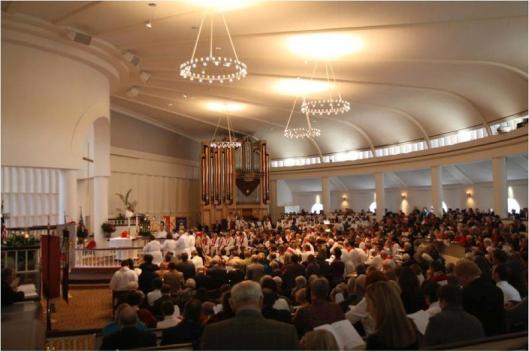Episcopal Church: I've Got 99 Problems but a Priest Shortage Ain't One
By Jeffrey Walton
http://juicyecumenism.com/2012/12/27/episcopal-church-ive-got-99-problems-but-a-priest-shortage-aint-one/
December 27, 2102
 The Falls Church (Episcopal) recently hosted a service for the Diocese of Virginia in which nine new priests were ordained. (photo: Falls Church Episcopal)
The Falls Church (Episcopal) recently hosted a service for the Diocese of Virginia in which nine new priests were ordained. (photo: Falls Church Episcopal)
On a Saturday morning earlier this month a gathering of 900 supporters from across the Episcopal Diocese of Virginia crowded into the main sanctuary of the Falls Church Episcopal (won from departing Anglicans in May through a court verdict). The special service celebrated nine transitional deacons ordained to the Episcopal priesthood by Bishop Shannon Johnston.
The service partly filled the role of using the reclaimed church campus for diocesan purposes (the diocese recently relocated its Northern Virginia office from Goodwin House in Alexandria to the Falls Church.) The service also showed how a diocese that has suffered a significant drop in attendance over the past decade is not lacking for new priests.
Unlike steep declines in membership, finances, and number of parishes that have negatively impacted the life of the Episcopal Church, the denomination has seen a more gradual decline in priests, maintaining - in some areas like Virginia and Texas - more than enough to meet its needs. While rural congregations do struggle to attract or support full-time paid clergy, an overall ample supply of priests is surprising, given that a recent report on the state of the clergy in the Episcopal denomination identified a 26 percent drop in ordinations over the past six years.
The Roman Catholic Church, in contrast, has faced a sharp decline in vocations for much longer. It would be tempting to link the Episcopal clergy abundance to a larger pool from which to draw: the Episcopal Church does not require its clergy to practice the discipline of celibacy, opening the priesthood to more men. But the number of new male priests has actually dropped by over half since the early 1970s. Probably a more likely explanation for surplus priests is that women and - increasingly - openly gay candidates for the priesthood are either commonplace or swiftly becoming so.
All of the Episcopal Church's 11 accredited seminaries enroll women, and many have had majority-female graduating classes for years, often filled with second career aspiring clergy (the average age of Episcopal priests has steadily increased every year, with the typical woman ordained now in her 50s). As for gay clergy, some liberal dioceses of the church have openly ordained them since the mid-1980s, and once-moderate dioceses like Virginia have even begun doing so (the December ordination service at the Falls Church included one openly lesbian priest, Jo Belser, who is the first openly homosexual candidate to be ordained by the diocese).
The average age at ordination is now 44 (up from the early 30s in 1970) and the average age of active Episcopal clergy is 58.
In 2011, the neighboring Episcopal Diocese of Washington temporarily suspended the diocesan discernment process for those seeking ordination, citing an overabundance of priests. In January of 2012, Bishop Maryann Budde extended the suspension through December 2012 "and longer, if necessary."
"Given the number of relatively healthy congregations and the appeal of our location, the Diocese of Washington has far more people interested in pursuing ordination than can reasonably hope to find employment in the Church," Budde wrote in January 2012. "There are currently almost 30 people in the ordination process, a number that well surpasses the diocese's current need for clergy for traditional parish positions. In addition, there is a significant number of unemployed and underemployed priests in the diocese who are seeking to be called to stipendiary ministries."
To date, the diocese has not announced plans to resume discernment for ordination.
Even with declining numbers of new ordinations nationally and a corresponding increase in the average age of active Episcopal clergy, fears from 10-15 years ago that the church would suffer a clergy shortage seem unfounded. The overall decline in Episcopal Church attendance (down 23 percent in the past decade) has, quite simply, reduced a need for new priests. As Bishop Budde candidly wrote in her letter explaining discernment suspension: "A Roman Catholic colleague once asked me if the Episcopal Church was also experiencing a clergy shortage. 'No,' I said. 'What we have is a shortage of lay people.'"
Jeff Walton writes on Anglican issues for the Institue on Religion and Democracy (IRD)













